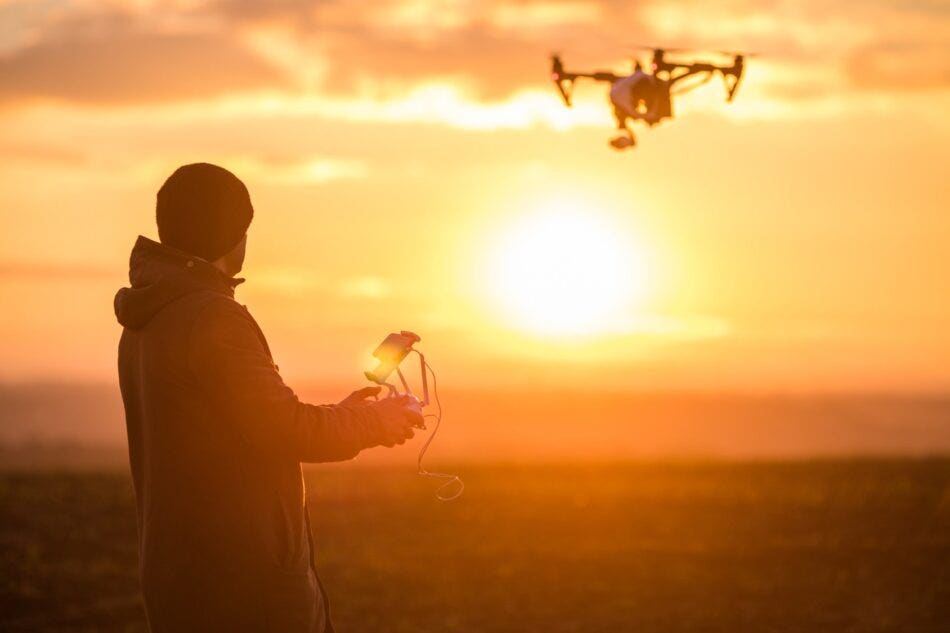With innovative technology comes fun and new business opportunities but also risks and responsibility. This is especially true when it comes to drones. From recreational racing to package delivery and security services drones are being put to all sorts of uses. And it seems every day sees a new use for them. No wonder the number of drones hitting the skies each year is growing rapidly.
But as the popularity of drones grows so too does the number of accidents associated with them. They’ve caused personal injuries commercial damage to storefronts and been linked to air crashes among many other mishaps. Which raises the question of liability – with private properties getting damaged and people getting hurt by these unmanned aerial vehicles who is responsible for what?
Thinking Drone Insurance in Alberta
Clearly drones have the potential to get their owners and operators into trouble which is why drone insurance makes sense. So what is drone insurance? It protects you in the event your drone causes damage – think of it as drone liability insurance . It’s not insurance for damage to your own drone (although that too is important considering some of those contraptions cost as much as a small car).
In the unfortunate event that your drone injures someone damages private property or you get accused of invading someone’s privacy you could be on the hook for large amounts of money in legal fees and damages if you don’t have insurance.
But getting drone insurance isn’t quite as straightforward as say insuring a bike. This is still a relatively new field and general insurance companies have not adapted as quickly to the growth in the use of drones as one would expect. Unless you go to a specialty insurance company that understands and deals with the peculiar issues related to the use of drones you will find that the language in which issues related to drones in non-specialty insurance policies is quite vague. Such ambiguity from insurance companies can be costly for down the line. So the first to do is to speak to an insurance company that has specialized knowledge of hobby crafts like drones. Then you can go on to the next question “what kind of insurance do I need?” It all depends.
How do you intend to use your drone?
How you use your drone impacts your decision to get insurance for it – and how much. Whether you’re a casual hobbyist who just flies your drone in your backyard or a professional photographer looking to capture more magical moments or looking to use drones for business purposes your insurance needs will vary. Make sure you know how you will intend to use your drone and choose insurance that will cover all the associated risks.
Recreational Uses: If it’s for low-level recreational purposes insurance might not be a requirement and you’re probably fine if you limit your flying time to the backyard or racing on an empty field. But you should always err on the side of caution especially because drones can be unpredictable. There’s no saying whether that drone will cause some unintended damage to your neighbour for which you will be responsible or you may accidentally violate someone’s privacy. Your current homeowners or renter insurance policy might not cover the costs of damages if your drone breaks something injures someone or invades someone’s privacy.
Commercial Uses : If you’re thinking of using your drone commercially then you absolutely must get drone insurance. Not only is no insurance or insufficient insurance a risky move it can leave your business totally vulnerable in case of an accident. Think of your drones the way a trucking company would think of its fleet.
In-Between Uses: Perhaps you consider your use as being more than low-level recreational use but also not a commercial use. Just a serious drone pilot who can take on occasional projects. Well any serious drone pilot should have liability insurance. It not only demonstrates to any potential partners that you are professional and reputable and keeps you protected.
A specific commercial policy will cover a lot of things – even those you hadn’t considered like hijacking your drone or fire liability. Keep in mind that you can’t insure your drones under your homeowner’s policy if they’re being used for business purposes.
Even if you’re not a commercial pilot but do use your drones to take on special projects of a commercial nature you should still have insurance. And there are times when you might need a minimum level of insurance coverage to take on a special project or to work with a larger company that requires insurance for each of its vendors. You should get insurance to cover those periods.
There are different types of drone insurance policies to choose from. If you work with the right insurance broker he or she can help you find the right coverage that suits your needs.

